During these cold months it can be challenging to keep our pets healthy and happy. The cold weather often brings a slew of things to watch out for when it comes to keeping Fido and Fluffy out of trouble.
Six Tips For Healthy Pets in Winter
Dr. Carol Osborne, DVM offers a few essentials to get your furry friend through these frigid months without a trip to the vet’s office.
-
Pick Pet Safe Ice Melting Products
When using ice melting products like Rock salt and De-icing chemicals, spritz your pet’s feet with water when they come back inside to avoid irritation of their skin and paws. Signs of ingestion include excess drooling, depression and vomiting.
-
Antifreeze + Pets = A Deadly Combination
Antifreeze is deadly for pets. Clean up spills/leaks immediately and make sure that it is stored in a sealed container locked in a secured cabinet. If you think your pet has consumed antifreeze, this is a true life or death emergency! Go to your vet ASAP and call ahead while you are on your way!
-
Protect Your Pets Form Cold Temps
Keep your pets protected from the frigid temperatures (if it’s too cold for you, it’s too cold for your pet. Offer a little extra food during the winter months because more calories are burned trying to maintain body heat).
-
Safeguard Your Pets From Frostbite
Frostbite risk areas include your pet’s ears, nose, tip of the tail and ears. Frostbitten areas of skin initially turn a reddish color then become gray. To treat frostbite: give your pet a warm bath and wrap him or her up in warm towels. Don’t rub an area that has frostbite!
-
Serve Up Homemade Meals for Your Pets
Homemade meals for your pet are a healthy and cost effective way to ensure your pet is getting essential nutrients without the risk of indigestion, weight gain due to over eating and the high caloric intake of processed foods. Cuisine made of equal portions of a lean protein (chicken, turkey, beef, veal, duck, fish or eggs), long-acting carbohydrates (potatoes, rice, pasta or oatmeal) and fresh vegetables (broccoli, spinach, green beans, lima beans, peas and carrots) are ideal. Cats require more protein than dogs, so 80 percent lean protein and 20 percent veggies is perfect.
-
Cover Your Bases, Place Rat & Mouse Baits in Safe Places
Rat and Mouse baits are usually used more often in cold weather. Place baits in areas inaccessible to your pets. Peanut butter baits smell good and are tasty to pets. Save labels, and if you think bait has been eaten by your pet, get to your vet ASAP. Call ahead while you are on your way! Most pets are treated with Vitamin K therapy and recover.

